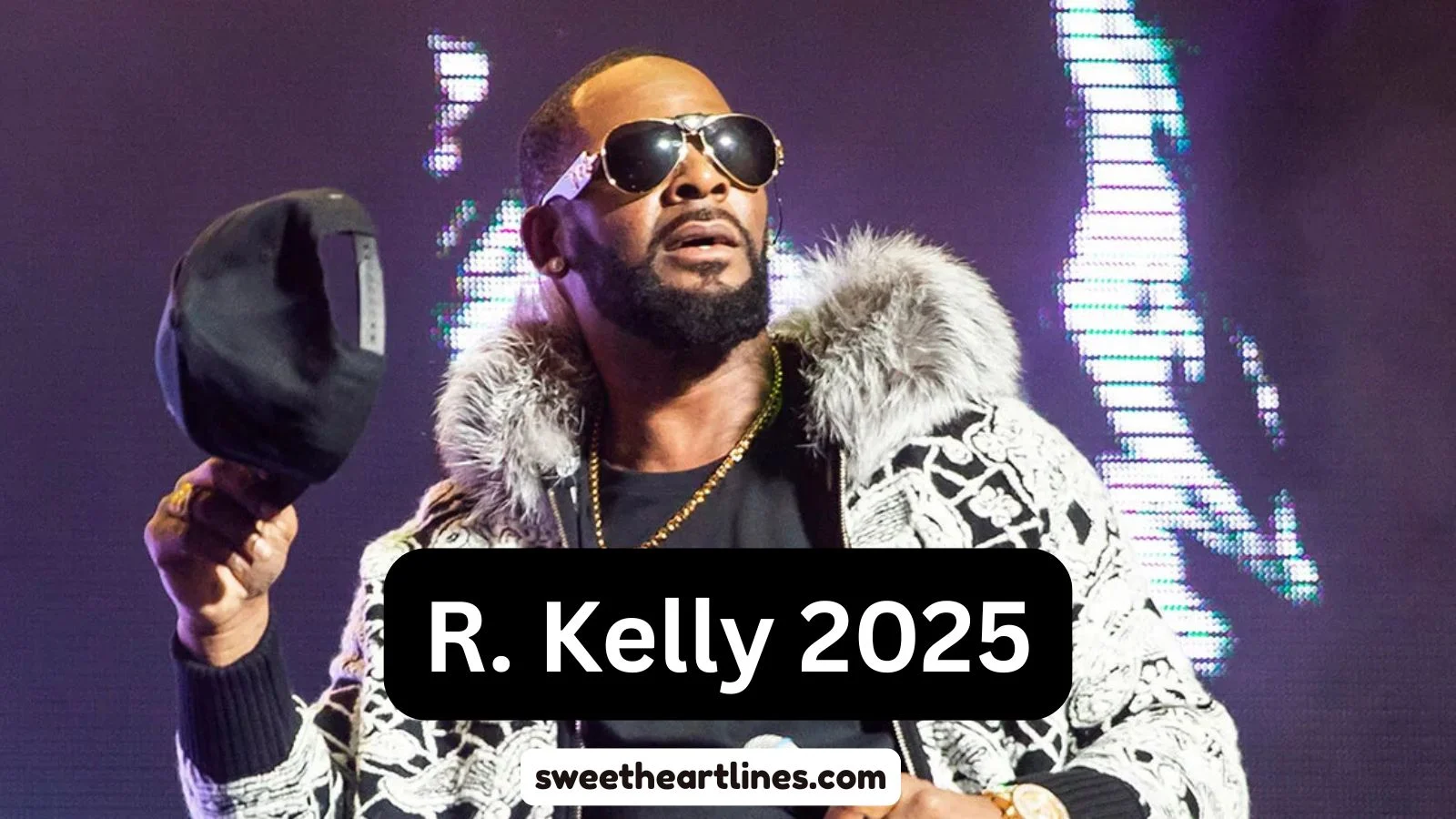Few figures in modern music spark as much heated debate as R. Kelly. Known once as the “King of R&B,” he crafted songs that defined weddings, graduations, and quiet nights everywhere. Yet in 2025, his name is less associated with romance and more tied to scandal, lawsuits, and prison sentences.
This article unpacks his journey, his art, the storm around his legacy, and what the world might learn moving forward.
The Rise of R. Kelly: From Chicago Streets to Global Fame
Robert Sylvester Kelly, born in Chicago in 1967, wasn’t born into privilege. Raised in public housing, his early years were shaped by struggle, hardship, and a love of music. He often credited gospel and soul influences like Sam Cooke and Marvin Gaye for shaping his sound.
By the early ’90s, R. Kelly had broken into the mainstream with “Bump N’ Grind” and “I Believe I Can Fly.” His voice was silky, his melodies addictive, and his presence magnetic. To many, he was proof that talent could overcome adversity.
The Musical Genius and the “King of R&B” Label
R. Kelly wasn’t just a singer—he was a writer, producer, and innovator. He penned hits for himself and others, from Michael Jackson’s “You Are Not Alone” to Celine Dion’s duets. His ability to blend gospel-style storytelling with sensual R&B made him unique.
Fans crowned him the “King of R&B.” Even now, in 2025, some die-hard supporters argue that his influence is woven into every R&B artist who followed. For example, artists like Usher, Chris Brown, and Trey Songz show clear traces of Kelly’s vocal styling and lyrical approach.
But here’s the tough question: Can genius excuse misconduct?
The Dark Allegations That Changed Everything
Whispers about Kelly’s behavior began as far back as the late 1990s. Tabloids reported inappropriate relationships, rumors of underage girls, and secret marriages. For years, these allegations were brushed aside, often drowned out by his chart-topping music.
Things shifted dramatically with the 2019 documentary “Surviving R. Kelly.” Survivors came forward with powerful testimonies, painting a chilling picture of manipulation, control, and abuse. Public opinion flipped almost overnight, and what was once rumor became undeniable evidence in the court of public perception.
Trials, Convictions, and Sentencing: A Legal Timeline
- 2002: Kelly faced child pornography charges but was acquitted in 2008 after a long, drawn-out trial.
- 2019: Federal charges were filed for racketeering, sex trafficking, and child exploitation.
- 2021: Convicted in New York on multiple counts, marking a historic downfall.
- 2022–2023: Additional sentencing in Chicago added decades to his prison time.
- 2025: Kelly remains in federal custody, serving a multi-decade sentence that likely ensures he’ll never walk free again.
His courtroom battles highlight a bigger cultural question: why did it take so long for justice to catch up?
R. Kelly in Prison: Life Behind Bars in 2025
Reports suggest R. Kelly’s prison life has been anything but glamorous. Once surrounded by luxury, he now lives in confinement, stripped of fame’s privileges. He’s reportedly writing music in his head but has limited outlets for expression. Some insiders claim he’s attempting appeals, while others say he’s facing health struggles.
Inmates reportedly recognize him, some with respect, others with disdain. Regardless, the reality is stark: the “King of R&B” now exists behind concrete walls and iron bars.
Fans vs. Critics: The Cultural Divide Over His Music
R. Kelly’s music sparks one of today’s most divisive cultural debates. On one side, fans argue:
- “The music isn’t guilty.” They claim his songs belong to the public, separate from his crimes.
- “His art helped us through tough times.” Some see his songs as part of personal milestones.
On the other hand, critics counter:
- “Supporting the music supports the man.” Royalties still benefit Kelly.
- “Songs can’t be divorced from context.” Lyrics now read in a darker light.
This tug-of-war continues in 2025, with no clear winner.
The Streaming Debate: Should His Music Still Be Available?
Spotify, Apple Music, and YouTube faced immense pressure. Some platforms removed R. Kelly from playlists, while others left his catalog untouched. By 2025, his songs are still accessible, though buried under warnings, disclaimers, and debates about corporate responsibility.
Streaming platforms tread carefully—remove him, and they risk censorship accusations; keep him, and they appear complicit. The debate illustrates a broader issue: where should we draw the line between access and accountability?
Separating the Art From the Artist: An Ongoing Dilemma
This isn’t just about R. Kelly. Similar debates surround Michael Jackson, Woody Allen, and even Picasso. Can society cherish the art while condemning the artist?
Philosophers and critics argue both sides:
- Pro-separation: Art can transcend its creator.
- Anti-separation: Art is inseparable from the moral character of its maker.
For R. Kelly, the dilemma is amplified by lyrics that, in hindsight, seem disturbingly reflective of his crimes.
Impact on the R&B Genre and Younger Artists
Younger R&B artists face a strange challenge: acknowledging Kelly’s influence while distancing themselves from his reputation. Some, like H.E.R. and Daniel Caesar, avoid citing him altogether. Others cautiously admit his influence on the genre’s sound but reject his personal behavior.
R. Kelly’s downfall leaves a creative vacuum but also opens space for healthier, more transparent artistry.
R. Kelly’s Legacy in 2025: Forgotten or Unforgettable?
In 2025, Kelly’s name isn’t celebrated, but neither is it erased. His music still plays at family cookouts and karaoke nights, yet fewer people admit to loving it publicly. His legacy now feels like a ghost—always present, rarely embraced.
Public Reactions: Social Media, Documentaries, and Pop Culture
Twitter (X), TikTok, and Instagram remain battlegrounds for R. Kelly discourse. Memes, think pieces, and viral videos keep his story alive. Documentaries and podcasts ensure the conversation doesn’t fade.
Some fans launch hashtags like #FreeRKelly, while survivor advocates counter with #MuteRKelly. The online world mirrors society’s struggle to resolve the paradox.
What Legal Experts Say About Possible Appeals
Legal analysts in 2025 note that Kelly’s chances of appeal are slim. His convictions span multiple jurisdictions with strong evidence. Still, lawyers sometimes pursue appeals to reduce sentencing rather than overturn convictions.
But for the public, appeals feel irrelevant. The damage—to victims, to trust, to culture—has already been done.
Survivor Voices: The Lasting Impact on Victims
The most important voices in this story aren’t Kelly’s or his fans’—they belong to survivors. Their courage reshaped the music industry, forcing institutions to take accountability.
Survivors emphasize that justice isn’t just about sentencing; it’s about acknowledgment and change. They’ve pushed for stricter protections in entertainment and more resources for vulnerable youth.
The Future of R&B Without R. Kelly
R&B is moving forward. Artists like SZA, Summer Walker, and Brent Faiyaz redefine the genre with vulnerability, authenticity, and innovation. The absence of Kelly’s dominance allows new voices to flourish.
R&B’s future looks less like one man’s empire and more like a diverse tapestry of storytellers.
Where Do We Go From Here? Lessons for Music, Society, and Justice
The R. Kelly saga isn’t just a celebrity scandal—it’s a societal lesson. It forces us to ask:
- Why did fame shield him for so long?
- How do we support survivors while still preserving cultural memory?
- What safeguards can prevent history from repeating?
The answers aren’t simple, but acknowledging the complexity is the first step forward.
FAQs
Is R. Kelly still in prison in 2025?
Yes, R. Kelly remains incarcerated, serving lengthy federal sentences that make early release unlikely.
Can you still listen to R. Kelly’s music on streaming services?
Yes, most platforms still host his music, though some have removed him from curated playlists.
Why was R. Kelly called the “King of R&B”?
Because of his unmatched success in the 1990s and early 2000s, blending gospel, soul, and sensual R&B in a way that influenced an entire generation of artists.
Did R. Kelly try to appeal his conviction?
Yes, legal teams filed appeals, but experts believe the likelihood of overturning convictions is extremely low.
What impact has R. Kelly’s case had on the music industry?
It sparked tougher conversations about accountability, exploitation, and separating art from artists, influencing how the industry handles allegations today.
Conclusion
R. Kelly’s story in 2025 is a haunting mix of brilliance and betrayal. His music shaped R&B, yet his actions scarred lives and reshaped cultural conversations. His fall from grace teaches us that talent doesn’t excuse wrongdoing, fame can’t silence truth forever, and society must listen when survivors speak.
The “King of R&B” may never reclaim his throne, but the lessons from his rise and fall will echo for years to come.












